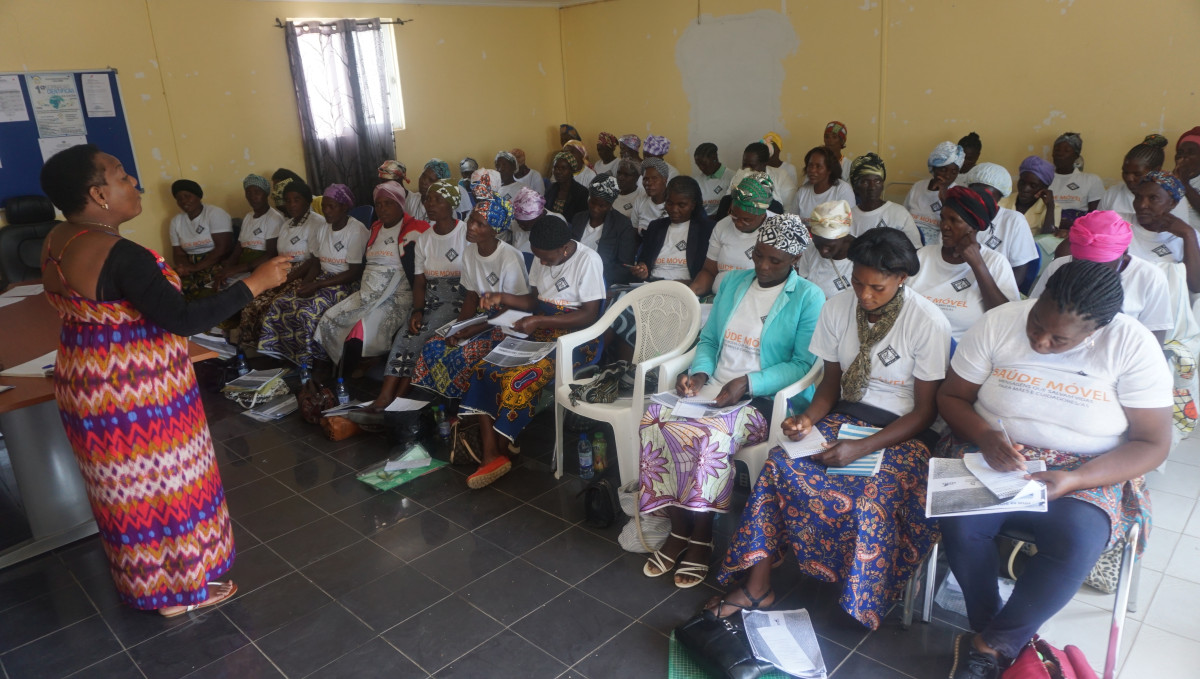Voice messages and trainings for traditional birth attendants improve childbirth practices and baby care in Angola
Published: Jan 8, 2018 Reading time: 3 minutes Share: Share an articleWhat are the safest practices in childbirth? What is the most important aspect of newborn care? Traditional birth attendants (midwives) of 6 rural and peri-urban municipalities in Huambo, Bié and Huíla Provinces are improving their knowledge in training sessions provided by People in Need’s MHealth project. Angolan mothers involved in MHealth project are also receiving voice messages with information on maternal care and baby care during the first 6 months of live.

“We are happy with the training because we are learning to do things that we didn’t know before”, says Maria Chilombo Gonçaves, 52 years old, who took part in an educational session in the municipality of Caála, Huambo province.
“I have been attending all MHealth training sessions. As a birth attendant in my community, the advice I give to pregnant women is to avoid wearing tight clothes, performing hard work, or going to the field often for cultivating because it can be harmful for both the mother and baby”, adds Maria Chilombo, mother of 11 children who has worked as a midwife since 1997.
Like her, about 600 traditional birth attendants are being trained in the communities attended by MHealth, a project funded by Fundo Soberano de Angola in partnership with the African Innovation Foundation and Unitel. The recent training session in Caála has engaged 60 beneficiaries.
Educational sessions are changing parturition practices in rural Angola. “Well before the MHealth programme started in our communities, we did our job in our houses, which is not right. We used to take the parturient to the hospital only when there were complications”, says Maria Kussinga, 58 years old. She has worked as a midwife for 20 years.
“I have been attending the training and I have learned that a birth attendant should follow women throughout pregnancy in order to guarantee a safe birth and to avoid maternal and neonatal mortality. I have also learned that we should encourage pregnant women to go to prenatal appointments”, adds the beneficiary.
Partnership with local health units
Doctor Adelina Bonga has lead the training in Caála. She highlights the partnership between PIN and the Health Direction in Huambo province. “We begin to act on what is really the objective of the organization: to qualify traditional birth attendants with the main objective of improving health services in our communities and avoiding maternal and newborn mortality”.
The head of the municipal health department in Caála, Albino Dumbi Ernesto, concludes: “The midwife plays a very important role in the community, because sometimes the pregnant woman cannot get to the hospital in time for birth, and it is necessary that the birth attendant reacts properly so that the baby can be born healthy. Post-childbirth, [it is necessary] to follow the mother and the baby to the hospital to be vaccinated.”
Life-saving voice messages
MHealth project has another important component of innovation for behavior change. Voice messages are sent to mothers and caregivers with information on maternal care and baby care during the first 6 months of life.
The messages are sent to beneficiaries’ mobile phones twice a week. The messages are pre-recorded and can be listened to in Portuguese or Umbundo, languages that prevail in the regions assisted by the initiative.








